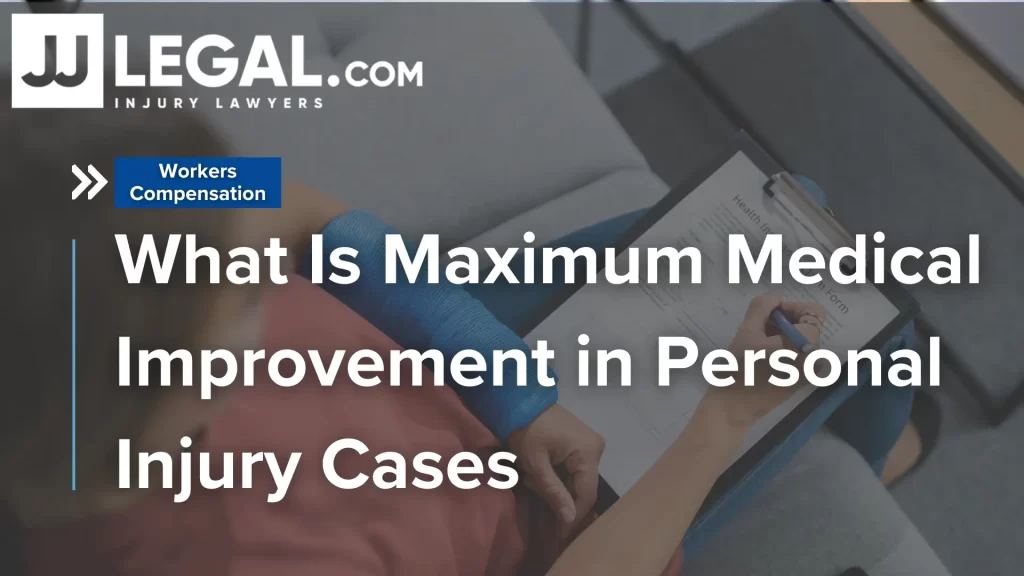 Are you trying to understand ‘what is maximum medical improvement’ (MMI) and its implications for your workers’ compensation claim? Simply put, MMI occurs when an injured worker’s medical condition stabilizes, and no further functional improvement is expected, even with additional medical treatment. This determination by a medical professional is crucial as it affects your compensation, ability to work, and future healthcare needs. Our article will guide you through everything you need to know about MMI, including determining it, understanding its role in your workers’ compensation case, and grasping what it means for your long-term welfare.
Are you trying to understand ‘what is maximum medical improvement’ (MMI) and its implications for your workers’ compensation claim? Simply put, MMI occurs when an injured worker’s medical condition stabilizes, and no further functional improvement is expected, even with additional medical treatment. This determination by a medical professional is crucial as it affects your compensation, ability to work, and future healthcare needs. Our article will guide you through everything you need to know about MMI, including determining it, understanding its role in your workers’ compensation case, and grasping what it means for your long-term welfare.
Exploring the Definition of Maximum Medical Improvement
MMI is a term you’ll often hear in workers’ compensation cases, but what does it mean? In simple terms, Maximum Medical Improvement (MMI) is a state where your medical condition has attained stability that doesn’t anticipate significant improvement or decline, regardless of continued medical care. At this point, a medical professional determines maximum medical improvement for your case, and considers you to have reached maximum medical improvement.
Determining MMI isn’t a subjective matter; it’s a task exclusively for a licensed physician, usually established after a thorough medical examination. The physician evaluates your condition to determine the extent of permanent impairment, which directly impacts the eligibility and level of your workers’ compensation benefits.
Hence, attaining MMI is a key requirement in the workers’ compensation claims process, influencing your compensation, settlements, and ongoing medical treatment.
The Role of MMI in Determining Workers Compensation Benefits
You might question, “How does MMI influence my workers’ compensation benefits?” The key to this query lies in the assessment conducted post-MMI, which essentially evaluates your workers’ compensation claim’s worth.
Various factors come into play, including your pre-injury wages and the ability to return to work. These factors significantly impact the type and amount of benefits you may receive after reaching MMI. If your injury permanently restricts you from returning to your profession, you may qualify for ongoing treatments and benefits, as well as permanent disability benefits.
How MMI Impacts Medical Treatment and Ongoing Care
Attaining MMI doesn’t imply a complete recovery. You might still endure permanent limitations, with little chance of further improvement in your condition. This significantly impacts the type and extent of further medical treatment you may continue to require.
Once your impairment reaches a permanent status at MMI, it implies that it will not significantly change within the next year despite ongoing medical treatment. At this stage, Functional Capacity Evaluations (FCEs) assess your impairment level and determine your capacity for work and other activities after reaching MMI.
Navigating Through Workers Compensation Claims Post-MMI
After reaching MMI, what’s next? It’s the phase where understanding the extent of your rights and potential benefits becomes imperative. You may receive permanent impairment benefits if your injury has caused long-term loss of function, even if you’re still employed.
Reaching MMI may affect your earning capacity, qualifying you for wage differential benefits. However, you don’t have to accept the initial settlement offered post-MMI. You have the right to negotiate further or formally contest the settlement if you feel it’s not fair. This is where legal assistance can be crucial in helping you obtain wage differential benefits and fair compensation for your injuries.
Permanent Work Restrictions and Their Consequences
For some injured workers, permanent work restrictions might be a reality. Suggestions for such restrictions arise when an injury hampers full recovery and limits the type of work an injured worker can undertake. Functional Capacity Evaluations establish these restrictions, determining the necessity for job modifications or vocational retraining.
The impact of these restrictions can be significant, potentially hampering your wage-earning capabilities. As part of the process following MMI, you must navigate job modifications, benefit eligibility, and legal actions for accommodations. If you’re laid off due to permanent work restrictions, you can apply for wage loss benefits, which may allow you to receive 80% of your after-tax weekly earnings.
Strategies for Collecting Wage Differential Benefits
Despite the challenges posed by permanent work restrictions, they don’t signal a termination of your income. If you take a lower-paying job post-MMI due to your injury, you can receive compensation for lost wages by calculating the difference between your previous and current wages.
In Illinois, for instance, the wage differential benefit equals 66 2/3 percent of the difference between your pre-injury and current wages, subject to the state’s average weekly wage limits. This means that you could potentially receive as much as 85% of your prior wages when required to take a lower-paying job due to injury.
The Critical Role of Independent Medical Examinations
An independent medical examination forms a vital component of the workers’ compensation process. It plays a vital role in assessing your injury claims impartially by reviewing your medical records and conducting a physical examination.
IMEs serve to:
- Validate your condition and confirm or refute the medical information provided by your treating doctors
- Determine the legitimacy of claimed injuries
- Challenge treatments and diagnoses
- Establish causation and prognosis for recovery
The examining physician evaluates your history, conducts a physical examination, and may order further testing to assess your injury. The IME report summarizes the findings, including opinions on the cause of injury and whether you’ve reached MMI.
Seeking Fair Compensation After Reaching MMI
While attaining MMI is a noteworthy achievement, it doesn’t signify the conclusion of your workers’ compensation journey. It’s crucial to ensure that any settlement reflects the full extent of your injuries, as settling too early may lead to the loss of rights to adequate compensation.
After MMI is reached, temporary disability payments stop, but you can negotiate for a lump sum settlement or other benefits based on your condition at that time. Legal assistance is pivotal in ensuring fair compensation and in negotiating settlements that do not adversely affect your Social Security Disability Insurance benefits.
To address severe long-term injuries effectively, you need to carefully calculate long-term financial needs, including medical bills, as you may receive a lump sum payment to cover future missed wages.
Understanding Impairment Ratings and Disability Benefits
Impairment ratings and disability benefits are crucial factors in determining your compensation. Specific guidelines determine impairment ratings based on the loss of use or derangement of any body part, organ system, or function, reflecting your functional limitations.
You receive financial benefits calculated based on your level of impairment and determined using these ratings. If you have permanent partial restrictions, you may be eligible for permanent partial disability benefits, depending on your specific ratings and circumstances. In cases of more severe impairment, you may qualify for permanent total disability benefits.
Multiple factors influence the compensation amount at the end of your claim, including the severity of residual physical limitations and your permanent partial disability rating, in addition to your understanding of your rights and potential benefits.
Legal Assistance: Partnering with a Workers’ Compensation Lawyer
Dealing with the complexities of MMI and workers’ compensation can be daunting, making the involvement of a workers’ compensation lawyer extremely beneficial. If an IME report is unfavorable, a lawyer can question the medical expert’s credibility and seek further evidence to support your claim.
Attorneys play a crucial role in negotiating fair settlement offers, ensuring they cover long-term needs, such as future medical expenses and income losses. For catastrophic injuries, engaging with a specialized legal team like JJ Legal, who offers free case reviews, becomes even more critical to address the complexities involved.
Free Consultation Offer at JJ Legal
While maneuvering through the intricate realm of workers’ compensation law and claims can be challenging, you’re not required to do it single-handedly. JJ Legal offers free case reviews for workers’ compensation claims, providing valuable guidance and support.
It’s a worthwhile step in understanding the prospects of your workers’ compensation claim following MMI and exploring how you can maximize your benefits with the help of the Illinois Workers Compensation Commission.
Maximizing Your Claim with JJ Legal‘s Expertise
 JJ Legal Our commitment is to ensure that injured workers in Chicago secure the entire range of benefits they are legally entitled to under the Illinois Workers’ Compensation Act. With a specific focus on catastrophic injury cases, JJ Legal is equipped to handle severe workplace injuries, including:
JJ Legal Our commitment is to ensure that injured workers in Chicago secure the entire range of benefits they are legally entitled to under the Illinois Workers’ Compensation Act. With a specific focus on catastrophic injury cases, JJ Legal is equipped to handle severe workplace injuries, including:
- Back and neck injuries
- Paralysis
- Amputations
- Brain injuries
- Spinal cord injuries
Beyond catastrophic injuries, the firm also represents cases involving physical injuries from accidents, occupational diseases, and repetitive strain injuries. By leveraging their broad scope of legal expertise, JJ Legal can help you maximize your claim and ensure you receive the compensation you deserve.
Chicago Workers Compensation Attorney
Navigating the complexities of workers’ compensation claims after reaching MMI can be daunting. But by understanding MMI and its implications, knowing your rights, and leveraging at JJ Legal, our Chicago workers’ compensation attorney can ensure that you receive the compensation you deserve. Call JJ Legal at 312-200-2000 for a free consultation.
Whether you’re facing permanent work restrictions, seeking wage differential benefits, or looking to understand impairment ratings and disability benefits, it’s crucial to have a comprehensive understanding of these concepts. Even after reaching MMI, the journey isn’t over. With our team, you can maximize your claim and ensure your needs are met now and in the future.
Related Reading:
- Guide To When a Car Accident Claim Exceeds Insurance Limits
- Taking Legal Action for False Car Accident Claims
Frequently Asked Questions
What is Maximum Medical Improvement (MMI)?
Maximum Medical Improvement (MMI) signifies that a person’s medical condition has stabilized with no significant expected changes in the future.
How does MMI affect my workers’ compensation benefits?
After reaching Maximum Medical Improvement (MMI), a doctor will assess your capabilities to determine your workers’ compensation benefits, considering factors such as pre-injury wages and ability to return to work. This assessment influences the type and amount of benefits you may receive.
What happens after I reach MMI?
After reaching MMI, it’s important to understand your rights and potential benefits, such as permanent impairment benefits, even if you are still employed. These benefits are available if your injury has resulted in long-term loss of function.
What if I disagree with the IME report?
If you disagree with the IME report, you can consult a workers’ compensation lawyer to challenge the medical expert’s credibility and gather additional evidence to strengthen your claim.
How can JJ Legal help me with my workers’ compensation claim?
JJ Legal can assist you with your workers’ compensation claim by offering free case reviews and providing dedicated support to ensure injured workers receive the benefits they are entitled to under the Workers’ Compensation Act.



